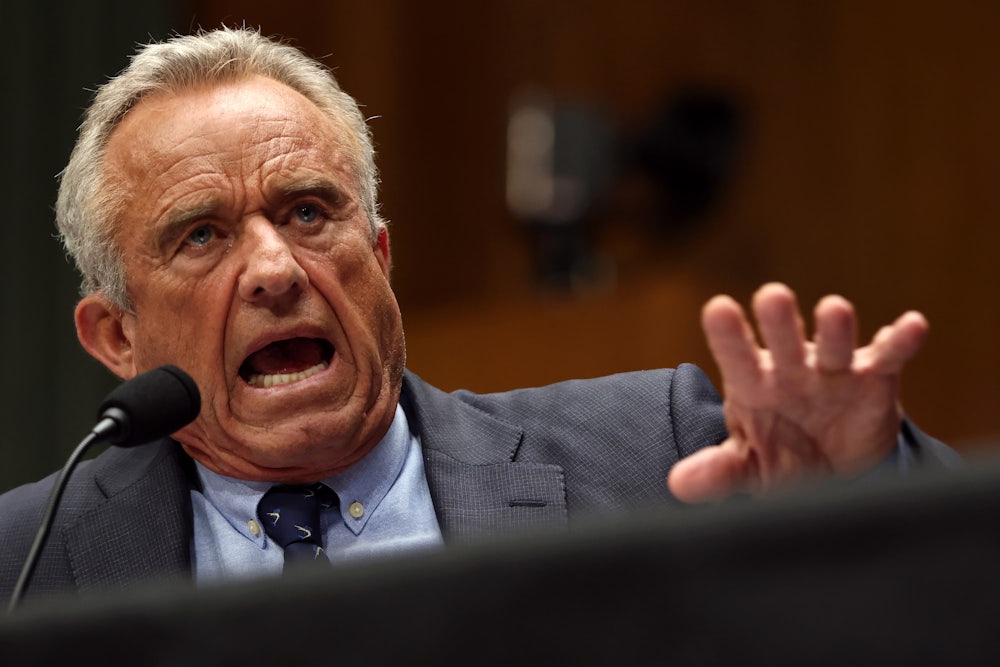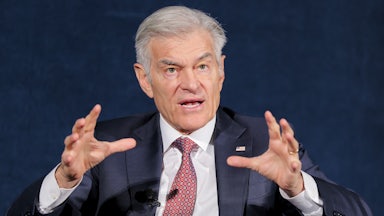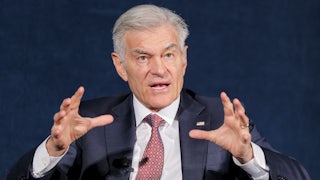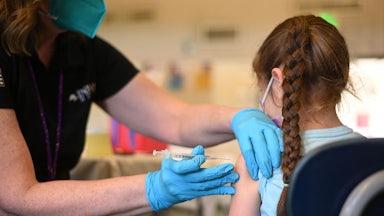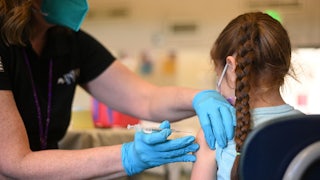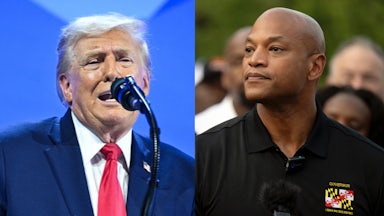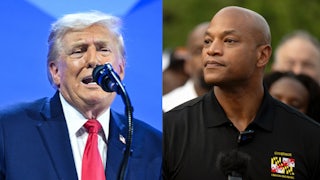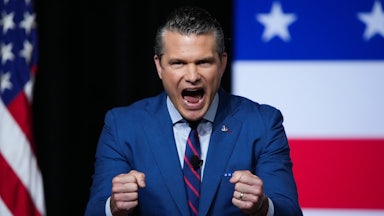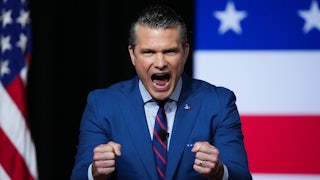Leigh Haldeman, a nurse at a hospital in Seattle who is 32 weeks pregnant with her second child, was advised in early June by her medical team to get vaccinated for Covid. This was not idle medical advice: She’d had complications in her first pregnancy that made her high risk if she were to get Covid. Her midwife advised her to get the vaccine while she was still pregnant, to avoid getting Covid in her third trimester and to protect her newborn.
What should have been a straightforward vaccination turned into a Kafkaesque runaround—one that portends the chaos to come for people trying to get Covid vaccines now and come the fall. The result will be lower rates of Covid vaccination and higher rates of transmission, long Covid, hospitalizations, and deaths with a summer surge already underway.
In late May, Department of Health and Human Services Secretary Robert F. Kennedy Jr. had taken to X to announce that Covid vaccinations would no longer be recommended to pregnant people or healthy children, although long Covid is now the most common chronic condition among children.* A week before, the Food and Drug Administration had also announced that healthy people under age 65 would not be eligible for the shot.
The announcement raised a flurry of questions and panic within the public health community: Notwithstanding the fact that this abrupt announcement occurred on social media rather than any official channel, it preempted the late June meeting of the Advisory Committee on Immunization Practices, or ACIP, a team of experts who have handled annual vaccination recommendations for the past half-century. It also, of course, went against the hundreds of studies on the Covid vaccine’s safety and efficacy. Recent data on last winter’s Covid shot showed 30–40 percent additional protection against urgent care visits and 40–70 percent additional protection against hospitalizations and ICU stays, with protection lasting six months or more.
The directive was also contradictory, marking an unprecedented divergence in the guidance from public health experts at the CDC and competing information coming down from RFK Jr. and the FDA. The CDC clearly lists pregnancy as an underlying qualifying condition for a Covid vaccine, and did not remove its recommendation for vaccination in children from its vaccine schedule.
This all left Haldeman in a tough position. At work at the hospital, she and her colleagues in infectious disease medicine had no idea if she would be allowed to get the vaccine, although they all agreed she should. Haldeman previously had no issues getting vaccinated or boosted for Covid-19, and received a booster during her first pregnancy.
She made an appointment and went to the closest Walgreens. The staff there immediately noticed she was pregnant and told her they couldn’t administer the vaccine—they could only give it to her if she was immunocompromised, and they did not consider pregnancy to fall under that category. “It was very frustrating,” she said.
When asked for comment, a Walgreens spokesperson said that “Walgreens is proud to continue serving our patients as a trusted and convenient resource for immunizations” and will “continue to closely monitor and review all federal and state guidance related to vaccines.” The spokesperson clarified that the policy varies, state by state.
After being turned away, Haldeman called her primary care doctor to see if they could give her the vaccine, but they told her they didn’t have it in stock. The midwifery clinic didn’t either. No one had good advice to offer, other than calling around pharmacies until someone would do it.
So she called a nearby Safeway pharmacy. The person on the phone first said no, but when she objected, she was transferred to a pharmacist. The pharmacist said maybe she could get the vaccine if she got a prescription from her provider and brought that with her to the pharmacy, but didn’t guarantee it would work.
Armed with a prescription, she went to the nearest Safeway, only to discover that it didn’t have the vaccine in stock. At the second-closest Safeway, staff noticed she was pregnant and panicked, and had her sit in a waiting room. “I was in tears at this point, just so frustrated,” she said. “I wasted so much time.”
Haldeman eventually succeeded in getting her vaccination on her fourth attempt, but the experience left her unnerved and upset. “I had to advocate for myself so much to actually get the vaccine,” she said, recognizing that most people, especially those who are hesitant about vaccines in the first place, would likely give up. Moreover, the experience made her feel criminalized: “If someone’s treating you like you’re doing something illegal, then you’re going to assume that there’s something wrong with what you’re doing, even though the evidence is clearly very much in support of getting vaccinated while pregnant,” she said.
A company spokesperson told The New Republic that Safeway is “committed to providing care that aligns with the latest public health recommendations … in accordance with CDC guidance.… Currently, individuals, including those pregnant, with specific medical conditions that increase their risk of severe illness remain eligible for vaccination.” Still, Haldeman had to get a prescription from a doctor to obtain the vaccine.
Haldeman’s experience makes clear that medical professionals, pharmacies, and people trying to get vaccinated are all weathering the fallout of RFK Jr.’s announcement restricting Covid-19 vaccines and the muddle that followed, and trying to figure out how to proceed amid the confusion.
“Secretary Kennedy’s decision is already causing substantial uncertainty and access issues,” said Dorit Reiss, a law professor at the University of California, San Francisco, and expert in legal issues around vaccines.
Just days before the ACIP committee was set to meet, RFK Jr. abruptly fired all 17 of its members—all of whom were preeminent vaccine experts—and appointed eight new ones. Of the new appointments, most were prominent vaccine skeptics, many of whom had clear conflicts of interest. Amid the egregious diversions from established procedures, it has gone virtually unnoticed that the new slate of ACIP members didn’t even meet a voting quorum.
The meeting went ahead, despite objections, and the committee ended up postponing the vote on Covid-19 vaccine recommendations for pregnant people and children.
“I am not sorry that this group—several of which have clear anti-Covid-19 vaccine biases—did not vote on the issue,” said Reiss. “Apart from Dr. [Cody] Meissner, committee members lack subject matter expertise and several have clear anti-vaccine biases.”
The American Academy of Pediatrics, or AAP, boycotted the meeting—“We won’t lend out our name to a system that is being politicized at the expense of children’s health,” said the AAP president in a video posted before the event.
The Evidence Collective, a group of public health experts and communicators, logged 50 falsehoods stated during the two-day meeting. “The members didn’t seem to understand basic vaccine studies,” said Jonathan Howard, a neurologist in New York and author of the book We Want Them Infected.
Though the committee did vote to approve RSV shots and (most) flu shots, the new ACIP chair, Covid and vaccine skeptic Martin Kulldorff, a statistician and epidemiologist, announced two new working groups that would reassess children’s vaccines schedule recommendations.
Both Reiss and Howard commended the CDC staffers for presenting information in an informative and accessible way, despite the significant challenges they faced.
Reiss said that the vote for Covid vaccines could be held in October, when the next quarterly ACIP meeting is scheduled, or sooner at a separately scheduled meeting. Until then, as Dr. Angela Branche, an infectious disease expert at the University of Rochester Medicine, told Rewire, “we are basically operating blind.”
In early July, the American Association of Pediatrics—along with several doctors, including a pregnant plaintiff doctor who also had trouble getting the vaccine—sued HHS, arguing RFK Jr.’s directive and firing of the ACIP members was “arbitrary and capricious” and has caused significant harm to doctors looking to stock and administer the vaccine.
Reiss added that having a plaintiff with standing, or one like the pregnant doctor, “Jane Doe,” who has clearly been directly impacted by the directive, strengthens the lawsuit. (Reiss is not affiliated with the lawsuit.)
“Pregnancy increases the risk of severe illness and complications from infectious disease, including preterm birth and stillbirth,” the lawsuit text states. “However, the Directive creates barriers to access to the vaccine and has left Jane and her husband overwhelmed with stress and uncertainty. Her worries are not just for herself, but also for the health and safety of her unborn child.”
The strongly worded lawsuit underscores the importance of ACIP not only in establishing vaccine recommendations but also in determining insurance coverage, state and local laws, and vaccination requirements in schools and medical settings.
RFK Jr.’s directive restricting vaccine access via X “breaks the promise that the Secretary made to the Senate and the American people not to make it difficult to get vaccines or discourage them,” the text states. “The Directive, unless vacated, will result in preventable deaths, including the unborn and newborns under six months old.”
It continues: “The Secretary’s dismantling of the vaccine infrastructure must end.”
Reiss thinks it’s highly possible to prove RFK Jr.’s actions were “arbitrary and capricious.” As she explained to The New Republic, “In both the video and the directive, Secretary Kennedy provided very little explanation, let alone a thorough consideration of the existing evidence and a justification for deviating from past agency positions.”
In response to the lawsuit, the so-called “MAHA Institute” sent an unconvincing rebuttal to its subscribers.
Until a judge halts RFK Jr.’s directive, it will stand. Meanwhile, 80 medical associations reaffirmed their commitment to vaccination, while the University of Minnesota–based Vaccine Integrity Project is working with a number of partners to offer its own vaccine recommendations regardless of what the now-compromised ACIP decides.
The antidemocratic, anti-science actions at HHS go beyond RFK Jr., who has appointed like-minded henchmen like Jay Bhattacharya to head the National Institutes of Health and Dr. Vinay Prasad at the helm of the influential Center for Biologics Evaluation and Research arm of the Food and Drug Administration, or CBER.
Prasad, who I have written about in these pages, is overseeing a “consolidation of power” at CBER. He has repeatedly overruled FDA experts’ recommendations for Covid vaccines. He is behind the decree that they be restricted to people over 65 and those age 12 to 64 with underlying health conditions, according to Biospace, a life science news site. A July 9 memo by Prasad, riddled with egregious inaccuracies, argued that he felt “differently about certain aspects” of the FDA reviewer’s conclusions that Covid vaccines should remain broadly available.
“I think there has got to be a ton of frustration at the FDA with Prasad overruling them all based on vibes,” said Howard.
This alarming growth of authoritarianism at HHS is just the beginning. Although the vast majority of Americans, including Republicans, believe vaccines are safe, there will be considerable fallout from giving anti-vaxxers a mainstream platform of authority. In addition to confusion and mistrust, such sentiments have already led to a measles outbreak, which RFK Jr. is grossly mishandling, and the looming threat of bird flu.
The consequences of these policies will be more transmission of preventable diseases and death, in a time when accessing health care is about to become more difficult, with the largest Medicaid cuts in history imminent.
Amid the horrors, it’s easy to forget that Covid-19 remains a threat. “We’ve all sort of gotten numb to it,” said Haldeman. But without tools available to fight it, we’re walking straight into another public health disaster: “It’s really dangerous.”
* This article originally mischaracterized Kennedy’s May tweet.
